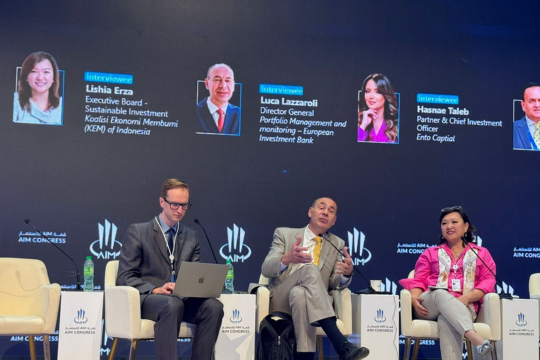Multi-Stakeholder Collaboration Drives Sustainable Coconut Productivity through Green Financing
PT Amartha Mikro Fintek has entered into a partnership with the Gorontalo Regency Government, which is a member of Lingkar Temu Kabupaten Lestari (LTKL) and Koalisi Ekonomi Membumi (KEM), as well as the Coalition of Coconut Producing Regional Governments (KOPEK), to support the sustainable productivity of coconut commodities in Indonesia through a green financing system.
This collaboration was inaugurated in Gorontalo, North Sulawesi, coinciding with World Coconut Day (WCD) 2023.
World Coconut Day 2023 in Gorontalo highlighted the importance of multi-stakeholder collaboration to support sustainable coconut commodity production. The event brought together international investors and coconut commodity producers to support the implementation of the sustainable coconut roadmap in Indonesia.
Aria Widyanto, the CEO of Amartha Mikro Fintek, stated that the company warmly welcomes the collaboration with LTKL, KEM, and KOPEK.
"We share the same goal of supporting the sustainable coconut production roadmap in Indonesia. As an inclusive financial platform, Amartha's support is not only in the form of sustainable financial access but also in providing financial literacy programs and assistance to coconut farmers and micro-business owners of coconut-derived products in Indonesia, especially in the Gorontalo area. The aim is to help coconut commodity businesses increase their income sustainably, create jobs in villages, and drive economic growth from the grassroots level," he explained.
Coconut commodities represent one of the largest markets, positioning Indonesia as the world's top coconut exporter and the second-largest exporter of desiccated coconut and coconut oil.
Indonesia's coconut production is expected to increase from 2022 to 2026. Likewise, the availability of coconuts for domestic consumption is projected to rise over the next five years.
On the same occasion, Amartha also launched its 2022-2023 Sustainability Report. The report contains data on the impact created by Amartha from an ESG (Environmental, Social, and Governance) perspective.
According to the report, Amartha's partners saw a 70 percent increase in income after receiving funding from Amartha.
Other economic impacts include the creation of informal employment. More than 156,000 Amartha partners in villages successfully hired their first employees, and 33,000 partners added new employees. The scale of partner businesses also increased, with around 40,000 micro-enterprises successfully growing into small and medium-sized enterprises.
Based on these research findings, Amartha is optimistic that sustainable financing for businesses in the coconut sector can also bring sustainable impacts to coconut farmers.
These impacts include increased production capacity, job creation, and local food security in Indonesia. In Gorontalo Province alone, Amartha has provided micro-financing to more than 30,000 MSMEs with a total fund of over 200 billion rupiahs.
"We welcome the collaboration with Amartha as part of the roadmap for improving sustainable coconut commodities. Coconut farmers often face difficulties in accessing financial services, even though they have great potential to drive sustainable economic development in villages. Therefore, the collaboration with Amartha, which provides financing for coconut commodities, cannot be separated from the sustainable coconut production roadmap," said Gita Syahrani from Koalisi Ekonomi Membumi.
Gorontalo Regent Nelson Pomalingo stated that World Coconut Day will serve as the initial momentum to establish serious and impactful business collaborations.
"If we work together, this can be developed into a landscape-based economic model that proves that in these areas, the environment can be consistently protected, and the communities can truly prosper. Currently, there is even a 670 billion rupiah Integrated Green Coconut Industry portfolio in Gorontalo ready to receive investments, resulting from Gorontalo's cooperation with BKPM," said Nelson, who is also the Chairman of KOPEK.
This collaboration is also in line with the president's and the Ministry of Agriculture's directives for coconut land development to strengthen the agricultural sector in facing the global food crisis and create household income in the future.
Amartha is optimistic that this collaboration can contribute to the sustainable coconut industry. The Integrated Coconut Industry will encourage the collective production base of coconut farmers through the development of environmentally and socially friendly business models. This approach could be a solution to the challenges of the climate crisis, food and water scarcity, and poverty issues currently faced globally.

